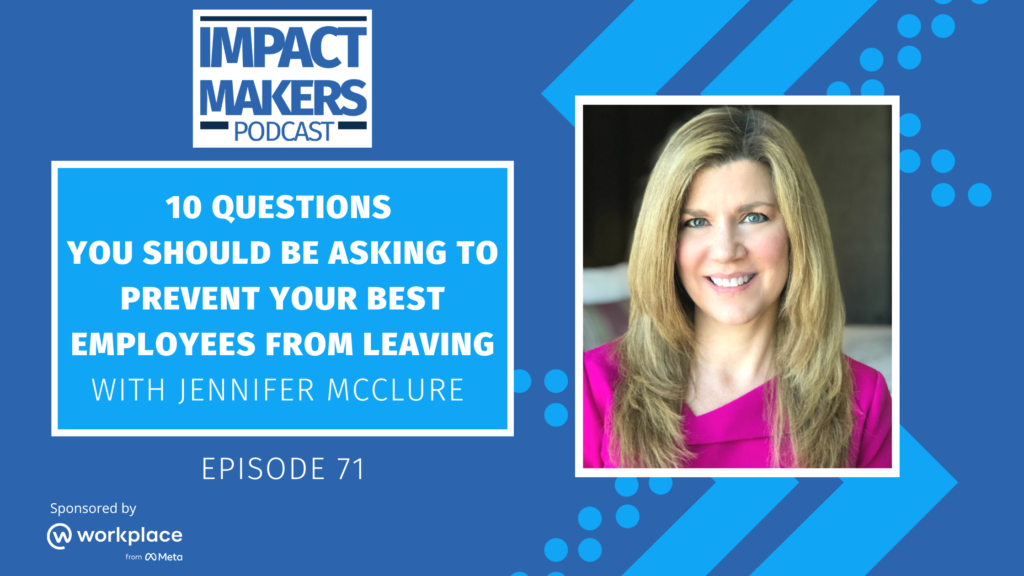
Quick request: Think about the company you’ve either loved or hated working at the most in your career…
If you had to describe your experience working at the company in just one word, what would that word be?
I’m going to make a confident bet that the first word that came to mind for you is related to the company’s culture.
Whether your word is something like caring, fun, challenging – or stressful, discouraging, difficult – your one-word assessment is a direct reflection of how YOU experienced the company’s culture.
Does this mean that your experience is the same as others who have worked for the organization? Not necessarily.
While one person may find an environment that’s fast paced and low rules to be energizing, another person who enjoys working in an environment that’s more laid back and structured may find that same environment to be extremely stressful.
Does that mean that something’s wrong with a company’s culture, because one person finds it to be a place where they’re very satisfied, while another is unhappy?
Nope.
What exactly is company culture?
The Great Place To Work® Institute defines company culture as follows:
Company culture is how you do what you do in the workplace. It’s the sum of your formal and informal systems and behaviors and values, all of which create an experience for your employees and customers.
At its core, company culture is how things get done around the workplace. “How” includes both the formal systems, and the informal behaviors.
What makes a company culture “successful”?
1. Established Values That Are Visibly in Action
The foundation of a successful company culture is a clear set of values. These values must be clearly understood and communicated, and the company’s leadership must be supported — as well as rewarded — for “walking the talk” and enforcing those values with their teams.
A great example of this is Hubspot, which clearly articulates who they aspire to be as a company on their website:
We’re building a culture where personal and professional growth are just as important as business growth. That’s why we created the HubSpot Culture Code. It shares our key values, like HEART — humble, empathetic, adaptable, remarkable, and transparent — and much more.
In their 128 page Culture Code slide deck, Hubspot states:
“We don’t just believe in these values, WE BET ON THEM. We recruit, reward and release people based on these values.”
The company also reinforces their values with THE HEART AWARDS, which are awarded to those who live those values every day and make others proud to work at HubSpot.
2. Awareness and Authentic Communication
How well a company understands their culture and communicates about it honestly and visibly is a key factor in both their leaders making good hiring decisions, and in prospective employees being able to determine if a workplace is one where they can thrive – or one that they should avoid like the plague.
For example, before starting my own business, I worked in three different HR leadership roles in start-up, high growth, and turnaround environments.
How would I describe those experiences? Fun. Challenging. Stressful.
And I loved almost every minute of it. Without consciously thinking about it at the time, I can now see that I was drawn to opportunities where the challenges were growth, change, and overcoming resistance.
However, in those same environments where I thrived, others were miserable. For some of my colleagues, consistent change, dealing with unknowns, and constant pressure to solve big problems was overwhelming – not energizing.
I learned that when it came to recruiting and hiring for each of those companies, it was critically important that we understood the work experience that we were offering to current and future employees and communicated those challenges/opportunities in our employment branding efforts, as well as during the interview process.
As my friend Kris Dunn, SVP of Global Talent Acquisition at Marriott International and author of The 9 Faces of HR: A Disruptor’s Guide to Mastering Innovation and Driving Real Change says in one of his classic DisruptHR Talks from a few years ago – Who To Hire When Your Culture Sucks:
“If you have a freak show, go ahead and tell the world you’re a freak show. You’ll actually get better matches, and people will think you’re authentic.”
Whether your company is a loveable “freak show” where only the strong survive, or it’s a Zen garden where the brightest minds blossom in tranquility — or somewhere in between — the most important thing is that you call it what it is. Because if you don’t, you’ll be called out by others who found out too late, and that can prevent you from being able to attract (and retain) the great talent that is truly a match for your culture.
3. Consistent Evaluation and Evolution
While it’s important for companies to have founding principles that establish and drive culture initially, the reality is that in our constantly changing world, company cultures must evolve and change as well.
To evaluate your company’s culture, I’d suggest at least a semi-annual review of employee satisfaction surveys, as well as customer feedback to understand how your culture is performing.
If feedback and results are positive, then no change may be necessary. But even when feedback is positive regarding the current state, maybe there are challenges ahead within your industry, or with the environment (workforce trends, economic shifts, societal norms, etc.) that will require removing, changing, or adding new values to create and sustain an environment that supports the company’s goals.
Companies that aren’t consistently doing a “culture check” may find themselves in a situation similar to the one faced in recent years by Uber.
Of course, Uber is known for completely disrupting an industry, and consistently having to overcome extreme resistance to change the way we think about transportation. When the company was founded, their original values included Meritocracy, Toe-stepping, Superpumped, and Always Be Hustlin’.
However, as the business matured, and the internal and external work environments evolved, this type of culture no longer served them well, and that led the company to near catastrophic failure. After several negative events involving both employees and customers, the company was forced to make significant changes in both their leadership, and their values, in order to survive.
4. Culture Is Not One Size Fits All
The importance of company culture, and what it is/what it isn’t doesn’t have to continue being debated. We all know it’s important, and every company is different. The path to success is not in trying to make your culture like another company’s, but to determine the values that you want to infuse into your own workplace, to communicate and re-enforce those values, and to be willing to change them as needed to meet the needs of our employees and customers.
The world — and the world of work — has dramatically changed over the last few years and will continue to change at a faster pace than ever before.
As a leader, one of your most important responsibilities is to ensure that your organization can attract and retain the RIGHT PEOPLE who not only have the skills necessary to do the work, but also are aligned with how the work is expected to be done (your company’s culture.)
_______________________________________________
As a keynote speaker and leadership coach, Jennifer McClure helps leaders to embrace the future of work, and to develop the skills necessary to lead their organizations and the people on their teams to take bold actions that positively impact business results.
Want more leadership and future of work insights from me?
SUBSCRIBE to get my weekly Impact Makers newsletter delivered to your inbox!



